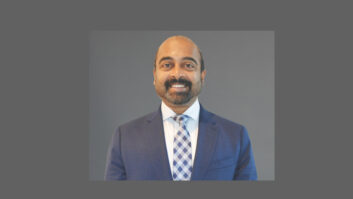
The National Association of Broadcasters took an active role in this year’s Broadcast Education Association Convention, held concurrently with the NAB Show in Las Vegas with three “Campus to Career” sessions for students interested in the radio broadcasting profession.
The “Rising to the Top” session featured José Valle, president of political and advocacy sales at Univision Communication and former president of Univision Radio, and Tim Clarke, senior director of the digital audience — radio for Cox Media Group.
Both men shared their personal radio career stories and the things they learned along the way.

José Valle addresses the crowd at the BEA convention.LEARNING TO LEAD
José Valle started his radio career at Heftel Broadcasting as a receptionist for two radio stations in Los Angeles. From that start, he moved on to sales assistant, account executive, promotions, production, sales management — in short, he did it all.
When Heftel went public, it began expanding its radio company. When it bought a station that was off-the-air in Las Vegas, the company asked 27-year old José Valle to become general manager.
It was building this radio station, hiring staff and introducing a new station to the Vegas market that gave José his first lessons in leadership. Success in Vegas would lead to bigger and bigger markets. When José was made president of Univision Radio, two of the radio stations he now oversaw included the very stations where he started at as a receptionist.
THREE LEVELS OF LEADERSHIP
The first level of leadership is the body, he says. José says these are the concrete supervisory things: short-term focus, initiatives, the quarter, tell people what you want done and getting people to follow commands.
The second level is the mind. Mid-range focus, yearly budgets, organizational designs and systems, review of data and rationales, talking through different perspectives based on different experiences.
The third one is the heart. This is leadership or partnership. It’s long-term focus. It’s about your personal skills, transparency and making sure organizational culture comes first. It’s what “we,” as a company, want to be about. It’s about managing values, assumptions, beliefs and expectations … envisioning purpose, honesty, openness, storytelling and tending emotions.
What this means is that you’re open and honest about the good, the bad and the ugly at all times. You tell people the truth, you’re transparent. When you mess stuff up, you tell them. When you’re scared, you tell them. You get close to your people and have everyone focused on the same goals.
Sometimes you have to be at level one leadership, like if the building is on fire, and yell for everyone to get out now. Sometimes you have to be on level two, strategically weighing the pros and cons, the opportunities and the risks.
But it’s at level three where you want everyone to feel comfortable. It’s where your people know they can share their concerns. You don’t want to have an environment that encourages the meeting after the meeting. You want those issues to be discussed at the meeting. You want those discussions to be open, so there isn’t a second group or a third group in your company.

Tim ClarkeTIM’S STORY
Tim Clarke is 28 years old. He started as an intern at age 17 in Long Island with Cox Media Group. His ultimate goal was to be a disc jockey.
From his internship, he was hired to be a part-time disc jockey. He quickly learned that to rise through the ranks you needed to be able to do everything. You had to become a “Swiss army knife.” You needed to be able to accept any job. You always needed to growing your skills and acquiring new skills.
Generalize Then Specialize — Tim’s first tip is to first generalize and then specialize. Eventually in your career, you’re going to have to become the expert at something, to be known for something; but you can’t do that until your first generalize. For Tim, that meant doing production, traffic, on-air, engineering, programming and talent development.
Advocates — Tim’s second tip is to cultivate advocates. They could be bosses, peers or people who work for you. They could be friends, people who work in the industry or outside the industry. People who can tell your story, people who understand you as a brand.
Raise Your Hand — Tim’s third tip was in order to keep growing, you need to raise your hand and ask for your next opportunity. You can’t just wait for people to come to you. Be proactive.
Know Your Style — Tim concluded his talk with what he said may be the most important tip: Know your style, so you can identify the type of culture in which you will thrive. Your career success will in large measure depend on how you fit in with the company you choose to work for.
“I’m crazy. I’m nuts,” said Tim. “I love the Mario Andretti quote that says ‘If you’re in control, you’re going too slow.” That type of style might never work for, say, GE, but Cox loves it about him, Tim told the room.
Career Paths Are Not Linear — In today’s world, career paths are no longer a straight line. A big reason for this change is the simple fact that your next job might not even exist today. Tim said only three years ago, the job he holds today didn’t yet exist at Cox Media Group.
In conclusion, Tim said, what’s most important is to find someplace where you can have an impact. If you’re not somewhere where you can make a difference, make a change.
Dick Taylor is a Certified Radio & Digital Marketing Consultant and assistant professor of broadcasting at Western Kentucky University in Bowling Green, Ky. He joined the faculty of its School of Journalism and Broadcasting after a 42-year career in radio. He is director of the KBA WKU Radio Talent Institute and remains on the board of the New Jersey Broadcasters Association.












